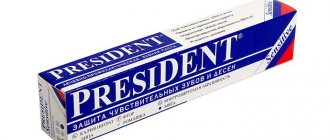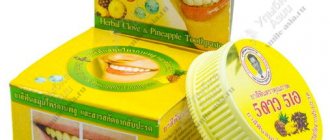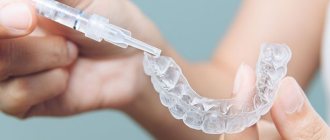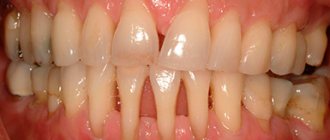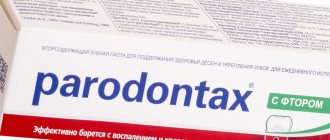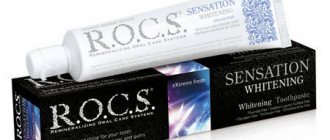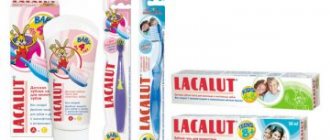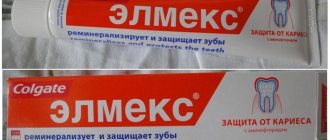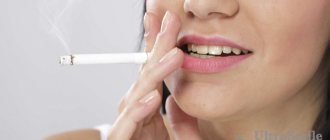- What does "organic" mean?
- How to determine natural toothpaste by composition
- The benefits and effectiveness of organic paste
- Which pasta to choose
- Organic pastes
Every year the popularity of a healthy lifestyle and reasonable consumption is growing. People choose environmentally friendly products to maintain their health, which is why organic products are in high demand. This also applies to oral hygiene. Organic toothpastes cleanse teeth of plaque, can relieve bleeding gums and enamel sensitivity, and do not contain harmful additives. What organic pastes are made from and what to look for when choosing them, you will learn from this article.
Mint
Peppermint or lemon balm extract is the most common natural ingredient found in toothpastes. Mint has antibacterial, antioxidant, antiallergenic, analgesic, anesthetic and anti-inflammatory effects. The leaves of this plant are a storehouse of natural benefits, and the taste of mint, unlike eucalyptus or menthol, is considered pleasant by almost every person. In toothpastes, mint extract is responsible for its pleasant taste, as well as its refreshing and antibacterial effect. You will find the mint component in “Vanilla and Mint” pastes from JASON,.
The best hygiene products for gum restoration
Periodontal damage can be of different types: mechanical, bacterial, hereditary, etc. They are accompanied by bleeding, inflammation of the mucous membrane, and increased sensitivity.
Hygienic products must have wound-healing, antibacterial and nutritional properties, relieve itching and prevent the formation of tartar. In some cases, antibacterial components are included in the active formula to suppress pathogenic microflora.
- Forest balm
- Parodontol Active
- ROCS Bionica
- Splat "Lavandasept"
- PresiDENT Exclusive
Sage
Another natural plant component that has a whole range of healing properties. Sage leaves, as well as its extract and essential oil, have been successfully used in pharmaceuticals for centuries. Sage has anti-inflammatory, antiseptic, hemostatic, and astringent properties. Dentists prescribe their patients to rinse with sage decoction after tooth extraction, when an antiseptic and wound-healing effect is required. When used in toothpaste, sage primarily fights bleeding gums. By the way, if you also use an ultrasonic brush, the antibacterial effect will be better.
How to determine natural toothpaste by composition
The following components can be found in organic paste.
- Herbs
(calendula, ratania, coltsfoot, oak bark, chamomile, string, sage, echinacea), tea tree essential oil, clay and propolis fight microbes and help relieve inflammation. - Minerals
(calcium, silicon) strengthen the enamel. - Salt
protects against the formation of plaque and tartar and relieves inflammation. - Lemon oil
whitens enamel. - Essential oils
of fennel, mint, and eucalyptus provide fresh breath.
To make the paste pleasant to taste and easy to use, add to it:
- natural sweeteners from rowan leaves, fibers of vegetables and fruits, citrus fruits, algae;
- dyes from juice and extracts from plants (for example, when adding dye from geranium, the paste acquires a pink tint);
- thickeners from molasses and rowan extracts.
Sometimes preservatives are added to organic pastes, but their content is minimal. They are needed so that the paste has the desired consistency and can be stored longer.
Cocoa beans
Perhaps the most delicious component on our list. The fact that dark chocolate is beneficial for the body has been known for a long time. Experts prescribed products containing cocoa beans to prevent cardiovascular diseases, normalize blood pressure, improve blood circulation, and so on. However, the first to realize the positive effect of these almond-shaped seeds on the condition of teeth was Tetsuo Nakamoto, the company's leading expert. He found that theobromine contained in cocoa beans has unique properties: it prevents the development of caries, strengthens enamel and other hard tissues. Based on this useful substance, the researcher created the Rennou™ formula, thanks to which a series of famous chocolate spreads was released. Products from Theodent™, in addition to all the above beneficial properties, perfectly cleanse teeth of plaque and promote the production of the happiness hormone.
The harm of mass production means
Mass-produced products contain additives that can accumulate and be absorbed by the mucous membrane over many years. Then, when it gets into the blood, it causes harm to the entire body. Harmful components can penetrate deep into the tissues of all organs and cause serious allergic reactions and diseases.
Harm is caused by various whitening additives that affect the condition of the enamel. Using such hygiene products over many years significantly worsens the condition of your teeth. After conducting many studies, scientists came to the conclusion that some mass-produced products can cause cancer, as well as provoke serious diseases of the gums and teeth.
Echinacea
Echinacea can rightfully be called the queen of medicinal herbs, because it stimulates the production of immunoglobulin in humans. As for its beneficial properties that can be used to create toothpaste, Echinacea extract has an antifungal effect and also contains phenolic acid, which has an antiseptic effect. Echinacea extract also helps with the healing of ulcers and wounds. You will find this useful component in .
Rating of hygiene products for children
Young parents pay increased attention to the choice of this type of product. It should be safe for the child, clean enamel and care for the oral cavity. At the same time, it does not cause negative effects even if swallowed.
It is important to consider the child's age. The active formula of products for the first erupted teeth, for milk and permanent teeth is different.
A special requirement is a pleasant taste and smell. If the baby doesn’t like it, it will be very difficult to teach the child personal hygiene.
- PRESIDENT Baby
- SPLAT Baby
- ROCS Kids
- LACALUT Kids 4+
- Colgate Elmex "Junior"
Clay
Oddly enough, another natural component found in many toothpastes is clay, but not the kind that sculptors and potters work with, but white clay, better known as kaolin. The benefits of white clay for teeth and gums are due to its high content of a number of minerals and trace elements, such as zinc, copper, potassium, magnesium, nitrogen and silicon. Also, white clay powder, or koalina, in toothpastes has absorbent properties and has an antiseptic effect.
Indian made products
There are a large number of Indian toothpastes and they perfectly whiten tooth enamel. Natural components and various extracts help get rid of plaque, tartar, and also disinfect well. It is worth carefully studying the composition before purchasing, since a large number of different components can cause allergies. Usually such a note is on every Indian paste with a natural composition.
There are more and more natural products now, and accordingly the demand for these products is also growing.
For example, Agafya toothpaste, made in Russia, contains more than 97% natural ingredients, gently cares for teeth and does not damage enamel. It will be an excellent substitute for famous foreign pastes. The price is low, since plant components are used, which are available in large quantities.
Sea salt
Sea salt, as well as rock and table salt, contains sodium, an essential trace element for the human body. However, unlike other types of salt, only sea salt becomes an ingredient in toothpastes. This is due to the fact that in addition to sodium, it also contains fluoride and iodine. And, unlike table salt, sea salt practically does not contain foreign impurities, since it is not pressed during production. You will find this useful substance in toothpastes “With Herbs and Salt” from Twin Lotus, toothpaste with fluoride “Sea Freshness” from JASON.
Organic pastes
European organic pastes are usually developed by specialists in dental clinics and laboratories, taking into account research in the field of oral hygiene. As a rule, they protect against caries, strengthen gum tissue and relieve inflammation.
Natural herbal toothpaste-gel Weleda
Weleda natural toothpaste with calendula
Natural toothpaste Weleda Rataniya
Dentissimo Vegan Toothpaste with Vitamin B12
Thai toothpastes clean and brighten enamel, protect against caries and freshen breath. Their advantage is their affordable price.
ISME RasYan Herbal Clove Polishing Toothpaste
Whitening paste 5STAR4A with coconut
Twin Lotus Herbal Original Toothpaste
Twin Lotus Kids Toothpaste Orange and Pomegranate (from 3 years old)
Organic toothpaste is a safe choice for adults and children. But often the action of herbal components is not enough to treat diseases of the oral cavity, and then classic pastes become necessary.
Papain
The enzyme papain is extracted, as you might guess, from the fruits and leaves of the papaya plant. Like many enzymes, the main property of papain is the breakdown of proteins. So what are the benefits of containing it in toothpaste? The fact that papain perfectly breaks down the protein layer that covers the surface of tooth enamel and absorbs plaque.
Fluorides: pros and cons
This may seem surprising to some, but fluoride can cause irreparable harm to the human body. This can happen if there is an excess of this substance. When consuming the norm, fluoride is even useful, because it performs a number of important functions, such as:
- increasing the strength characteristics of bones;
- acceleration of bone tissue regeneration in case of injuries (fractures), etc.
- influence on the growth and condition of nails, teeth and hair;
- ensuring caries prevention;
- activation of the body's defenses;
- prevention of osteoporosis;
- helping the body absorb iron;
- participation in the hematopoietic process;
At the same time, fluorine is a strong oxidizing agent, and its excess negatively affects bone tissue and tooth enamel. This chemical can cause mottled teeth, bleeding gums and weak limbs. That is, an excess of fluoride is much more dangerous than its deficiency.
When excess Fluorum enters the body over a period of 1-2 decades, bone fluorosis inevitably begins to develop, causing osteoporosis, osteosclerosis and osteosarcoma.
In children, with excessive concentrations of this substance, even before the teething stage, endemic fluorosis, which is a chronic lesion of tooth enamel, can develop. This disease is characterized by the appearance of spots of different shapes and sizes.
Some countries have even banned (or partially limited) water fluoridation. These include: Sweden, Luxembourg, France, Belgium, Israel, Japan, China and others.
It is worth noting that a person receives a sufficient amount of fluoride without using a paste containing it. To confirm this, a simple example can be given. The norm for an adult is fluoride consumption in an amount of about 2 mg.
If you drink 2 liters of water, eat a few apples and add rice or buckwheat to your diet, the result will be the required 2 mg of daily requirement. After all, water on average contains 0.5 mg of fluoride per liter; two apples contain approximately the same amount of this substance, which is already 1.5 mg.
Buying toothpaste without fluoride or containing it is everyone’s business. Among the manufacturers of natural products, there are also very worthy options that produce organic cleaning products with a small concentration of sodium fluoride. This is, for example, organic people.
Kelp extract
Laminaria, popularly known as seaweed, like many seafood, is rich in various beneficial microelements, in particular organic iodine, which gives pastes containing kelp extract antiseptic properties. Phytohormones and vitamins, also present in the kelp extract, stimulate the regeneration of the oral mucosa. Laminaria extract is present in toothpaste for its hemostatic and antiseptic effect, as well as to saturate teeth and gums with essential microelements.
What ingredients should you avoid?
The product contains chemical components that worsen human health, negatively affecting teeth, gums and the digestive tract:
- parabens - preservatives to extend the shelf life of the product; in large quantities they form cancer;
- propylene glycol is a preservative that damages liver and kidney cells, especially in the presence of inflammation;
- triclosan is an antibiotic that kills bacteria; when used frequently, it causes resistance and the development of superinfection;
- sodium lauryl sulfate – forms foam, leads to allergic reactions, peeling, inflammation, dry mucous membranes;
- polyphosphate - makes the structure thick and viscous, causes inflammatory processes in the mouth and the initial part of the gastrointestinal tract;
- fluoride – strengthens the strength of tooth enamel, but is toxic and causes digestive problems;
- abrasive components - clean fabrics, but with frequent application they damage the enamel.
These components are even added to natural posts. If the package says it is organic and foams a lot, it means it contains sodium lauryl sulfate.
Mumiyo
The most mysterious person on our list. Scientists are still arguing about the exact composition of mumiyo and how exactly it is formed. However, it is known for certain that this resinous substance has a number of healing properties. In particular, mumiyo is included in toothpastes to accelerate the regeneration of the mucous membrane and gums, as well as to strengthen the enamel and prevent caries.
"SPLAT Professional Maximum"
This is a product from a domestic manufacturer, aimed primarily at eliminating bad breath. Judging by user reviews, the product copes with this task perfectly: you are guaranteed fresh breath for 6-8 hours after use.
In especially difficult cases, the manufacturer recommends using a special gel from the same series for greater results. Then you can forget about bad breath for almost a day, but the cost of such service will more than double.
In addition, the presence of effective, and at the same time completely safe, natural ingredients allows you to thoroughly clean your teeth and get rid of plaque. Smokers and coffee lovers leave mostly positive reviews regarding the removal of yellowness.
The paste does not have an abrasive effect, so you don’t have to worry about the integrity of the enamel and gums. Whitening is implemented at a minimal level, but it is felt after a couple of days of use. The only thing that consumers sometimes complain about is the pronounced mint taste, and that would be fine, but due to the high concentration of mint in the composition, there is a noticeable tingling in the mouth. So for particularly sensitive people it is better to look for another, softer option.
Benefits of the paste:
- excellent stability – up to 8 hours;
- effective cleaning, including the elimination of yellow discoloration on teeth;
- suitable for sensitive teeth (if pronounced mint does not bother you);
- attractive price for the available characteristics.
Flaws:
- concentrated mint can sometimes burn the mouth.
The approximate cost of the paste is about 180 rubles.
Ginger
Ginger, or more precisely ginger root, is another natural ingredient often used in toothpastes. The benefits of this spicy plant are as follows: firstly, ginger is a natural antioxidant, secondly, it has a local hemostatic effect and improves blood microcirculation in the gums, thirdly, ginger freshens breath.
The best whitening products
Their action is based on the use of powerful abrasive and non-abrasive components. Abrasives have a coarse structure and are capable of removing even tartar. You need to be careful when choosing. Strong drugs may damage the surface. Non-abrasive compounds are gentle on hard tissues. But they cannot boast of whitening several shades.
- Lacalut White
- President White plus
- Splat "Whitening plus"
- Silca arctic white
- Rocs PRO “Delicate whitening”
Products for smokers should perfectly whiten specific pigment stains.
- Rembrandt “Antitobacco and coffee”
- Dentavit “For smokers”
- ROCS "Antitobacco"
- Zact "For smokers"
- White Glo
Bone tissue of cuttlefish
Our list of natural ingredients included in toothpastes is completed by a rather exotic substance - cuttlefish bone tissue, that is, powder obtained from the chitinous layer of these marine animals. The fact is that cuttlefish bone tissue powder has an ideal abrasiveness for cleaning teeth - it is harder than plaque, but softer than enamel, which allows it to delicately remove soft plaque, as well as age spots from tea, coffee and tobacco, without damaging the enamel .
What definitely should not be in the composition?
There are several components that should not be present in this product, because they can harm the body:
- Laurite sulfate.
- Coconut sulfate.
- Fluorine.
- Titanium dioxide.
- Chlorhexidine.
Some may contain: saccharin, coco and decyl glucoside. These components are harmful, but their use is completely acceptable. They should be used without much fanaticism. It is worth limiting products that contain: gum, sodium silicate, glycerin, benzoate. If you see such substances in the composition, it is better not to use it for daily brushing of teeth.
Important! Whatever product you choose, for the best effect you should use a toothbrush made of natural bristles.
Popular myths
Toothpastes in their modern form appeared around the end of the 19th century, and in recent years have experienced the peak of their development. They turned out to be much more convenient to use than the alternative tooth powder. And recent scientific developments have endowed conventional oral care products with new properties.
Such rapid development could not but affect society’s attitude towards toothpastes. Some consider them almost a medicinal product, others are of the opinion that the differences between the products lie only in the shape and color of the tubes. The truth, as usual, lies somewhere in the middle.
“The statement that to care for the oral cavity you need to choose a good toothbrush, and you can use any toothpaste, is incorrect,” comments dental hygienist Sabina Chistyakova. — Components of the composition can have a significant impact on oral health. With their help, you can combat problems with tooth sensitivity and bleeding gums. And finally, the composition affects the quality of teeth cleaning.”
pixabay.com/geralt
Here are some more popular myths that the doctor dispelled.
Myth 1. The best toothpaste in the world is only natural.
Most pastes contain “synthetic” components. And the fashion for everything natural has ensured the popularity of products made only with organic additives. They contain no sulfates, no preservatives, no fluoride. And this may seem like an advantage, but only at first glance.
“It is important to consider that natural toothpaste has a short shelf life,” says Sabina Chistyakova. - And due to the lack of sulfates, its ability to foam is reduced. Due to the fact that little foam is formed when brushing your teeth, the quality of cleaning itself is reduced. In addition, the product’s ability to remineralize enamel, that is, saturate it with minerals, is significantly lower than that of toothpastes containing fluoride.”
Myth 2: Stripes on toothpaste mean something.
It is believed that manufacturers label tubes depending on the naturalness of the composition. The green stripe is associated with completely organic products, the blue stripe with those that contain only 20% chemicals, and the red stripe with 50% chemicals. And if the stripe is black, it is customary to avoid such a product, since there is nothing natural in it.
This opinion is wrong. The color of the stripes on the tube does not provide any useful information to the consumer.
“Colored strips are markers for the packaging machine in production,” notes Sabina Chistyakova. “They have nothing to do with the composition or functions of toothpaste.”
Myth 3. There are safe toothpastes and dangerous ones. And they can somehow be distinguished
The safety of products is usually determined by their naturalness. However, even a completely “synthetic” product cannot be considered hazardous to health. Moreover, any paste that lies on the counter in a store is a priori safe, since manufacturers do not have the right to use harmful components in their composition.
Another thing is that a person may choose the wrong product for daily oral care. And because of this, you feel discomfort and pain when contacting hot or cold food.
“Depending on the condition of the teeth, there may be restrictions on the use of toothpastes,” clarifies Sabina Chistyakova. - For example, whitening products with a high abrasive content are not suitable for people with demineralized enamel and increased tooth sensitivity. Against the background of their use, sensitivity will only worsen. Therefore, it is better to coordinate the choice of remedy with your doctor. He will help you choose the best toothpaste, which will not only do no harm, but will also improve your oral health.”
pixabay.com/StockSnap
The best compositions for professional oral care
Products in this category are distinguished by the presence of special medicinal components or an increased concentration of active substances. Thanks to this, you can quickly and effectively cope with diseases or lighten your teeth.
Due to the nature of the formulation, the products are not always suitable for daily use. Some types can only be used once a week. You definitely need to pay attention to this. The best solution is to consult a dentist.
- Dental Clinic 2080 “Professional protection”
- Biorepair Desensitizing Repairer Treatment
- President White
- Parodontax "Gentle Whitening"
- Colgate Total 12 “Professional Cleaning”
